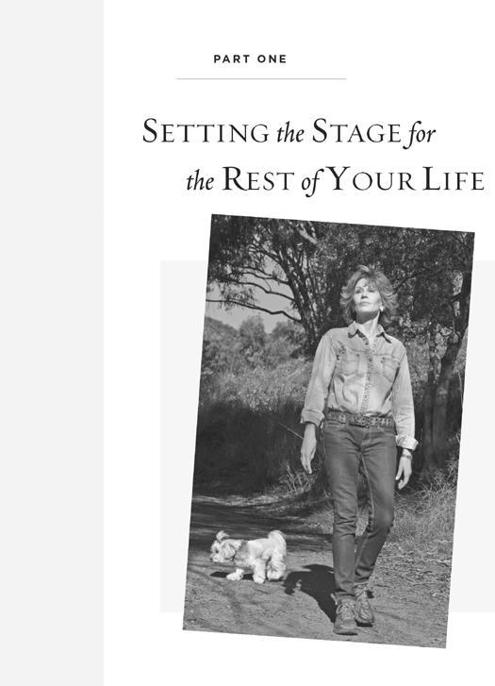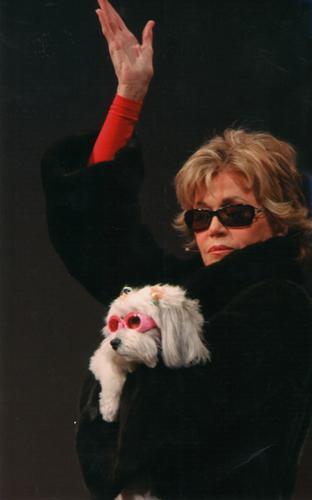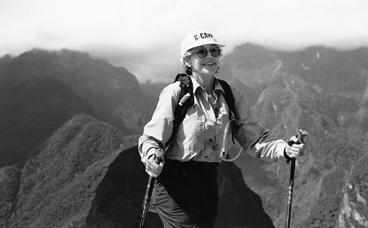Prime Time (3 page)
Authors: Jane Fonda
Tags: #Aging, #Gerontology, #Motion Picture Actors and Actresses - United States, #Social Science, #Rejuvenation, #Aging - Prevention, #Aging - Psychological Aspects, #Motion Picture Actors and Actresses, #General, #Personal Memoirs, #Jane - Health, #Self-Help, #Biography & Autobiography, #Personal Growth, #Fonda

With my dog Tulea in 2004.
MAX COLIN/ELIOT PRESS
Those of us now entering our Third Acts are, on the whole, physically stronger and healthier than ever before. There is every likelihood that, if we work at it individually and collectively, we can develop a new “culturally viable ideal of old age” and see our lives as a series of stages that build one upon the other. Our doing so will not be just for us; it will represent a major cultural shift for the world around us and will help younger generations reconceive of their own life spans.
I have been inspired and encouraged by what I have learned while writing this book. I hope reading it will do the same for you.
In Part One, I set the stage by discussing the three acts of life, the challenges and gifts that each of them presents, and ways for you to begin to step back—now, at whatever act you are in—and become a witness to your own life, in all its stages, and thus see better how to live the rest of it with greater intention, freedom, and clarity. I also write about how doing a life review transformed how I am living my Third Act.
In Part Two, I write about the body, the brain, and our attitudes. There’s some pretty good news there, as well as a new word: Positivity! I also, in
Chapter 10
, go into detail about how to write a life review.
Part Three goes into every dimension of love, friendship, and sex, including how to meet new people. You’ll find a few good laughs in there, along with a lot of handy tips.
Part Four isn’t what you’d expect in a book like this. But some of the most respected experts on aging believe—as do I—that to mount that staircase of late-life development as a fully realized person, we need to become advocates for the future. This can mean mentoring young children or protecting abused women; it can mean caring for the planet, feeling some responsibility for the big picture beyond ourselves. The psychiatrist Erik Erikson referred to this as “Generativity,” and here’s more good news: The thirty-year-long Harvard Study of Adult Development shows that among the women in the sample, “mastering Generativity … was the best predictor of whether they reported attaining regular orgasm”!
5
Part Four is also about the importance of facing our mortality and planning for late life—emotionally, financially, legally, and in terms of what we can do, individually and together, to make our society more supportive of seniors and help create a happier environment for them.
Part Five shows us how learning to go inward—spiritually and metaphysically—allows us to look outward with new eyes.
And so let’s begin.

CHAPTER 1
Act III: Becoming Whole
The greatest potential for growth and self-realization exists in the second half of life.
—CARL JUNG
Tulea and me during our “Broadway Series” skit in 2009.
H
OW OLD DO YOU FEEL?” SOMEONE ASKED ME RECENTLY. I THOUGHT for a moment before answering. I wanted to really consider the question and not give a glib “I feel forty” sort of answer. “I feel seventy,” I said, remembering a retort of Pablo Picasso’s: “It takes a long time to become young.”
Ageism
A while back, I spoke to a group of adolescent girls, and when I mentioned my age, some of them winced. They whispered to me that I should not let on how old I was, because I didn’t look seventy. They meant this to be a compliment, but I found it sad and a little scary. Like a lot of us when we were their age, and like our culture in general, these young women viewed age as something to hide, as if youth were the pinnacle of life. Well, maybe it is the pinnacle in terms of body tautness or sperm and egg count or thickness of cartilage and bilateral activation of the parahippocampal gyrus! But I’m not the only one who wouldn’t want to go back to adolescence—not for anything! It’s too hard! There’s too much anxiety about trying to fit in! I also wouldn’t care to repeat my twenties and thirties, for that matter. For me, those years were too fraught with trying to make my mark. And heaven forbid, let’s not repeat the “in between” time of the late forties and early fifties.
Richard and me on the red carpet at the
Vanity Fair
Oscar Party, 2011.
CRAIG BARRITT/GETTY IMAGES
For me, the “good old days” were really the “so-so old days.” I spent far too much time worrying that I wasn’t good enough, smart enough, thin enough, talented enough. I can honestly say that in terms of feelings of well-being, right now is the best time of my life. All those enoughnesses I worried about just don’t matter as much anymore. I have come to believe that when you’re actually
inside
oldness, as opposed to anticipating it from the outside, the fear subsides. You discover that you are still yourself, probably even more so.
For me, right now, this time in my life feels like I am beginning to become who I was meant to be all along. Act III isn’t at all what I expected. I never envisioned myself as a happy, learning-to-be-wise older woman.
It didn’t just happen. I have worked at it. I have been fortunate in myriad ways, and I have (sometimes despite myself) done what I needed to do to make the most of what I was given.
In society’s terms I may be seen as “over the hill,” but I’ve discovered a new, different, challenging landscape on the other side—a landscape filled with new depths of love, new ways of interacting with friends and strangers, new ways of expressing myself and facing setbacks, and, by the way, more hills … literally.
Hiking Machu Picchu in 2000.
Carl Jung pondered whether “the afternoon of human life [was] merely a pitiful appendage to life’s morning” or if it had a significance of its own.
1
I believe that Rudolf Arnheim’s diagrams of the arch and the staircase (which I wrote about in the Preface) answer Jung’s question perfectly. Yes, Act III has its own significance! This is when we are meant to go deeper, to become whole. It is the time to move from ego to soul, as the spiritual teacher Ram Dass says.
Professor Arnheim further illustrated his point by showing his students slides of the early and late life works of some of the world’s greatest artists. He felt that the paintings of the Impressionists, for example, were the “products of detached contemplation” that age can bring. The character and practical value of the material things they painted were no longer considered relevant; the specificity became blurred, so that, he says, what the Impressionists give us is “a world view that transcends outer appearance to search out the underlying essentials.”
2
Slowing Down, Going Deeper
Over breakfast at a restaurant in Ann Arbor, Michigan, I interviewed Dr. Marion Perlmutter, who is with the Center for Human Growth and Development and the Department of Psychology at the University of Michigan. Expanding on Professor Arnheim’s point, she told me, “It may be that it is only by suppression of certain things that we can actually get to higher levels. Was it that Monet had cataracts and couldn’t see well or was it that because of the suppression of that detail of vision he was able to get to the deeper level of the Impressionist essence? Cézanne had macular degeneration when he did his later pastels. Beethoven was deaf when he composed his Ninth Symphony. In late life we talk about slowing down as this horrible thing, but we also know that cognition is time-bound; the longer you take, the deeper you get to conceptualization. I think physiology helps us get there. It may be that only by slowing down can we really get more of a global perspective.”
3
The poem “Monet Refuses the Operation,” by Lisel Mueller, explains so artfully how age and infirmities can bring deeper insights. Here is an excerpt:
Doctor, you say there are no haloes
around the streetlights in Paris
and what I see is an aberration
caused by old age, an affliction.
I tell you it has taken me all my life
to arrive at the vision of gas lamps as angels,
to soften and blur and finally banish
the edges you regret I don’t see,
to learn that the line I called the horizon



